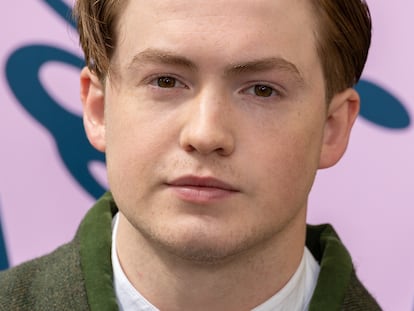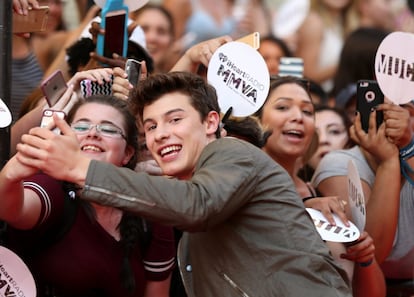The Kit Connor dilemma: Must we know an actor’s sexuality before they can play a gay role?
Last week, the actor went public about his bisexuality in response to fans of ‘Heartstopper,’ the Netflix LGTBQ+ hit show he stars in, who had accused the British performer of queerbaiting


On November 1, Kit Connor tweeted, “I’m bi. congrats for forcing an 18 year old to out himself. I think some of you missed the point of the show. Bye.” With that, the Londoner, who co-stars in the British Netflix series Heartstopper, ended months of insulting accusations. During that time, some of his followers argued that the fact that he had not publicly come out meant that he was straight, and was just exploiting his sexually ambiguous image.
This year, Connor – who has a long career in film and television, despite his young age – became one of the favorite faces of LGBTQ+ fiction for his role as Nick Nelson, the rugby player with a heart of gold. Nelson’s process of discovering and accepting his sexual identity is one of the program’s main plots.
Because Connor had not explicitly stated his sexual orientation, some Heartstopper fans believed that the actor was queerbaiting, the term used to describe the monetization of the LGBTQ+ image by someone who does not belong to the gay community or have a real commitment to its demands. In an article in British Vogue, “Kit Connor Didn’t Owe Us Anything,” journalist Scott Bryan recalled the end of the show’s first season, when Connor’s character finally feels ready to come out of the closet to his mother. “This coming out scene was not only a tender and emotional watch, it was also empowering, because Nick was ready and willing to tell her – not forced to or obligated by any external circumstances… It is an utter shame that on the public stage, Kit was not given the same opportunity,” Bryan wrote.
back for a minute. i’m bi. congrats for forcing an 18 year old to out himself. i think some of you missed the point of the show. bye
— Kit Connor (@kit_connor) October 31, 2022
“Coming out of the closet and coming to terms with your sexual orientation – bisexuality, in this case – takes time, it takes maturity; it requires discussing it first with those you trust the most,” says Gabriel J. Martin, an expert in gay-positive psychology. “Because he’s known all over the world, I understand why this guy would have preferred to talk quietly with his family, with his loved ones, first, and then, if he felt like it, tell everyone else, but he’s not obligated to do so, because it is private. He had no choice but to make it public so that the attacks on him would stop. The truth is that he has been bullied; it’s the same bullying that many LGTBQ+ people complain about.”
Last September, Connor deleted his Twitter account after photos went viral of him walking hand in hand with fellow actress Maia Reficco, his co-star in A Cuban Girl’s Guide to Tea and Tomorrow (the film is currently in production). After reactivating his account to announce his bisexuality, both his co-star Joe Locke and Alice Oseman, the show’s screenwriter and creator of the original comic book that inspired the show, have expressed their support for the actor, and criticized the followers who had been pressuring Connor.
“I truly don’t understand how people can watch Heartstopper and then gleefully spend their time speculating about sexualities and judging based on stereotypes. I hope all those people are embarrassed as FUCK,” Oseman tweeted. In the wake of the controversy, other users have reflected on the legitimacy of accusing individuals of queerbaiting, instead of the companies that ultimately profit from the image.

In addition to Kit Connor, straight celebrities – including singers Harry Styles, Charlie Puth and Shawn Mendes – have often been called out for adopting LGTBQ+ culture. For example, Styles experiments with his clothing, sports an LGBTQ+ flag on stage and plays a gay cop in the recently released My Policeman. As Styles explained to Rolling Stone: “Sometimes people say, ‘You’ve only publicly been with women,’ and I don’t think I’ve publicly been with anyone. If someone takes a picture of you with someone, it doesn’t mean you’re choosing to have a public relationship or something.” For his part, Shawn Mendes has introduced the term “wishdar” into the popular vernacular; it refers to hordes of fans who are hell-bent on wishing that someone had a certain sexual orientation. As Mendes lamented in The Guardian, “There was a desperation for me to come out as being gay, which is such a ridiculous thing. I got upset because I know people who are gay who haven’t come out and I know the suffering they experience because of that. It’s just completely ignorant and insensitive of people to be on that shit.”
Anxious to see themselves represented
The fact that Connor turned out to be bisexual, amid accusations that he was secretly straight but sought to profit off the gay public, has not gone unnoticed among those who believe that bisexuals have been rendered invisible. “Dating a girl doesn’t detract from being bisexual; it’s part of the definition… Many times, we are very extremist for no reason, and everything is black and white, as if you can only be straight or gay,” says psychologist Gabriel J. Martin. He goes on to note that what happened in Connor’s case represents another example of toxic fandom, “as happens with Star Wars, The Lord of the Rings or any other successful series.”
However, when asked about whether we are seeing the reverse of the days when non-heterosexual actors had to hide their sexuality to protect their careers, Martín cautions that the situation is more complex: “[LGBTQ+ members] are hungry for representation. It’s understandable that a person who is coming to terms with who they are, figuring out their identity, what they like and who they fall in love with, needs to have some role models. So, you project yourself onto other people. But those projections can go too far.”
“In that process of finding oneself, which is personal, we end up turning it into a demand that someone else behave in a certain way… [but that person] is independent, free, and… can and should act as he or she pleases,” Martín reflects. “The search for references is natural, but sometimes it is done too zealously; when someone does not act as you expected, it disappoints you personally and you externalize it on social media... On the other hand, when someone is a star in the LGBTQ+ community, we are very demanding of their public behavior; that’s something we do not do with heterosexual people. It’s a worrisome purity test, as if we need them to represent us and the community perfectly.”

Last May, just a month after Heartstopper premiered, Connor discussed the debates around his sexuality on the podcast “Reign with Josh Smith”: “We’re [Connor and his fellow cast members] all still very young. For me, I just feel perfectly confident and comfortable with my sexuality, but I’m not too big on labels and things like that. I don’t feel like I need to label myself, especially not publicly.”
As journalist Quinn Rhodes wrote in a column in the British edition of Metro, “Queer representation is life-changing and I’m as frustrated as the next bisexual trans man at how often straight, cis actors win awards for roles where they portray queer people… But Connor wanting to take time and not label his sexuality yet is miles away from a cis man being cast to play a trans woman.”
Heartstopper is now in the process of filming its eight-episode second season. Beyond the storylines in the comics, the new episodes are expected to delve into the consequences of Kit Connor’s character’s decision to come out of the closet. It remains to be seen whether screenwriter Alice Oseman will take this opportunity to send the show’s fans a message.
Tu suscripción se está usando en otro dispositivo
¿Quieres añadir otro usuario a tu suscripción?
Si continúas leyendo en este dispositivo, no se podrá leer en el otro.
FlechaTu suscripción se está usando en otro dispositivo y solo puedes acceder a EL PAÍS desde un dispositivo a la vez.
Si quieres compartir tu cuenta, cambia tu suscripción a la modalidad Premium, así podrás añadir otro usuario. Cada uno accederá con su propia cuenta de email, lo que os permitirá personalizar vuestra experiencia en EL PAÍS.
¿Tienes una suscripción de empresa? Accede aquí para contratar más cuentas.
En el caso de no saber quién está usando tu cuenta, te recomendamos cambiar tu contraseña aquí.
Si decides continuar compartiendo tu cuenta, este mensaje se mostrará en tu dispositivo y en el de la otra persona que está usando tu cuenta de forma indefinida, afectando a tu experiencia de lectura. Puedes consultar aquí los términos y condiciones de la suscripción digital.








































